Featured Stories
Matt Hall’s Music Journey, Aided by Marine Corps Stint
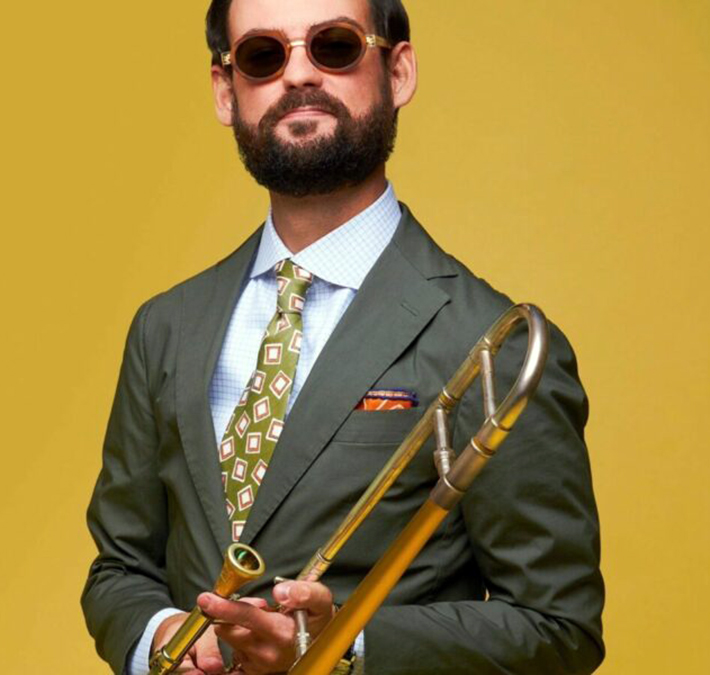
Matt Hall
Some of us fall into our chosen profession. Others figure it out in college or the military. Some of us are still trying to figure it out even as we approach retirement.
For jazz trombonist Matt Hall, his career path was set early on in his childhood in Kingsport, Tennesee. He remembers not only the year, but the specific moment—a secular epiphany that set his life on its course. Heading into middle school (sixth grade), he had signed up for chorus, but quickly realized that it was a mistake.
“That lasted all of one day. I just didn’t know what I was getting myself into at all. I quit chorus after a single day, and I was put back into the pool of kids that don’t necessarily have anything chosen yet that they want to do. My buddy in math class turns around and says, ‘There’s band auditions during lunch period; they’re holding additional ones. Would you come down with me while I audition?’ I remember distinctly voicing to him that I was NOT joining band and that was not on my radar at all.
“I go down to the band room, and the director, Mr. Shane Ladd, hands me a trombone mouth piece and asks me to make some sort of buzzing into it. I made some sort of a sound, and he says, ‘Okay, you play trombone’ and hands me a piece of a paper with the names of some music stores in the area.
“I go home and tell my Great Aunt Joan that I’ve joined band and I need to go get a trombone, and she couldn’t believe it.”
While his great aunt, who adopted him when he was five, was supportive of his music, Hall recollected that band wasn’t necessarily going a whole lot better than chorus.
“I go to the music store with her and get a trombone and, for the first year, I really wasn’t getting much of anywhere with it. I felt like all the other trombone-playing classmates were passing me up. They were able to hit higher notes than I was playing. I was considering giving it up after the first year, and then I heard this local phenom trombone player by the name of Rick Simerly on his debut album, Simple Complexity. It just totally turned my world completely from the second I heard him. He was the first professional trombonist I’d ever heard… actually the first jazz I heard was this recording.
“He was playing a cadenza on ‘Giant Steps,’ and just the dissertation he was throwing down on the instrument was nothing short of awe-inspiring. So, I end up finding this guy online and emailing him, asking him how he does what he does. The next morning he had shot me an email back, very thoroughly answering every question I had asked him. We were pen pals for probably two months, maybe three, before I met him and saw him play live. Really, that point was the real catalyst for me becoming a professional trombone player and a jazz musician altogether. Right when I heard Rick, and especially once I heard him live, I knew that was it—this IS what I’m going to do: jazz trombone.
“I guess I didn’t know what was possible at all on the instrument until hearing this recording. After hearing it, a real light bulb went off, and my (wood)shedding got much more serious. I went from sometimes practicing to where I would skip school a week at a time just to play trombone, just to learn tunes and play jazz. I was completely addicted to it. That really lasted all throughout high school into my first bit of college.”
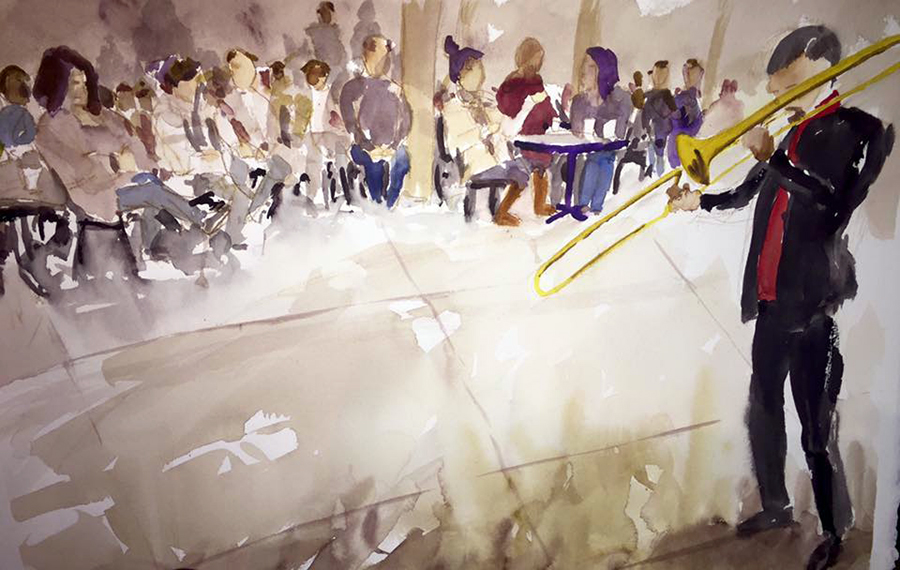
Artwork by Brian Meyer.
Needless to say, Hall came back for seventh-grade band. But pursuing jazz at school wasn’t always easy once he got into high school, because marching band was a higher priority of the administration for much of the year.
“They had a little jazz band program that would meet whenever possible. The high school band was more marching band-driven at that time. We also had a pretty nice concert band that we would do after the football season. They also had the all-state program in Tennessee, which was initially split into three regions: east, middle, and west. If you scored high enough, first or second chair in any of those regions, you got to audition for All State, which included the best players from those regions. And that would meet in Nashville, so I got to do that for a couple years.”
And he was already gigging around town.
“I started leading my own quintet in the eighth grade. We had a very busy schedule—13 to 30 dates a month. Mostly places like restaurants. We put out a record with that group, The Second Floor Cats. That group lasted from my eighth grade year through about my sophomore year.”
During his senior year of high school, Hall’s great aunt died, and he went to live with his step-sister Ann. He was accepted to Middle Tennessee State and was also directing an after-school high school jazz ensemble.
But Hall said, “It was time for a change after my short stint at Middle Tennesse State. At the time, college wasn’t really something that I was wanting to do. I was really interested in just playing as much as possible.”
And so, he considered joining the military to pursue music full time.
He had gone to the local Air Force recruiting office, but “they didn’t really have much information about the music program and just gave me a Washington, D.C. phone number. I looked at this sheet of paper and thought, ‘Man, this isn’t right.’”
Not long after the visit to the Air Force office, a Marine recruiter was visiting the high school campus where he taught after school to talk to the high school students. “The band director goes over and speaks with the Marine and says, ‘This is the guy you need to be talking to.’ I said, ‘You can forget it, I’m NOT joining the Marine Corps—they’ll kill me!’ The next thing I know I’m in the recruiting office chair signing up for an audition. I think I had two weeks before the adjudicator was going to be in town. So, I really hit it hard in the shed for those two weeks and felt really good about that audition. It was my first really serious audition. It was sight reading, major and minor scales, and two prepared pieces… and also, I could improvise as well, and that certainly was a bonus. Versatility is really something that is very necessary in military bands.
“Pretty much that day I knew the adjudicator was very pleased with the audition. If you score high enough—at that time it was on a 4.0 scale— you could choose where you wanted to go that had a band. At the end of the audition, she asked, ‘Where do you want to go?’ I started to do my research on these different Marine Corps bands, and I ultimately chose Miramar due to having a connection out there. I got an album of the Marine Corps Jazz All Stars, and I decided to contact the trombone section to ask them about their duty stations. The lead trombonist, Ken Ebo, who wasn’t on any social media or any way of reaching out to him, so I just started going down the list. The second tombonist, Erik Dewhirst, was on Facebook, and we ended up having some really nice conversations about the good, bad, and ugly of the United States Marine Corps and the band program. After speaking with him online, I decided this could really be a good thing for me. But he was stationed at Miramar, so I did a little bit more research, and decided that Miramar would be a solid central point for me to move to. It would also be a very dramatic move from East Tennessee, which is kind of what I was looking for at that time.”
The Marine Corps Years
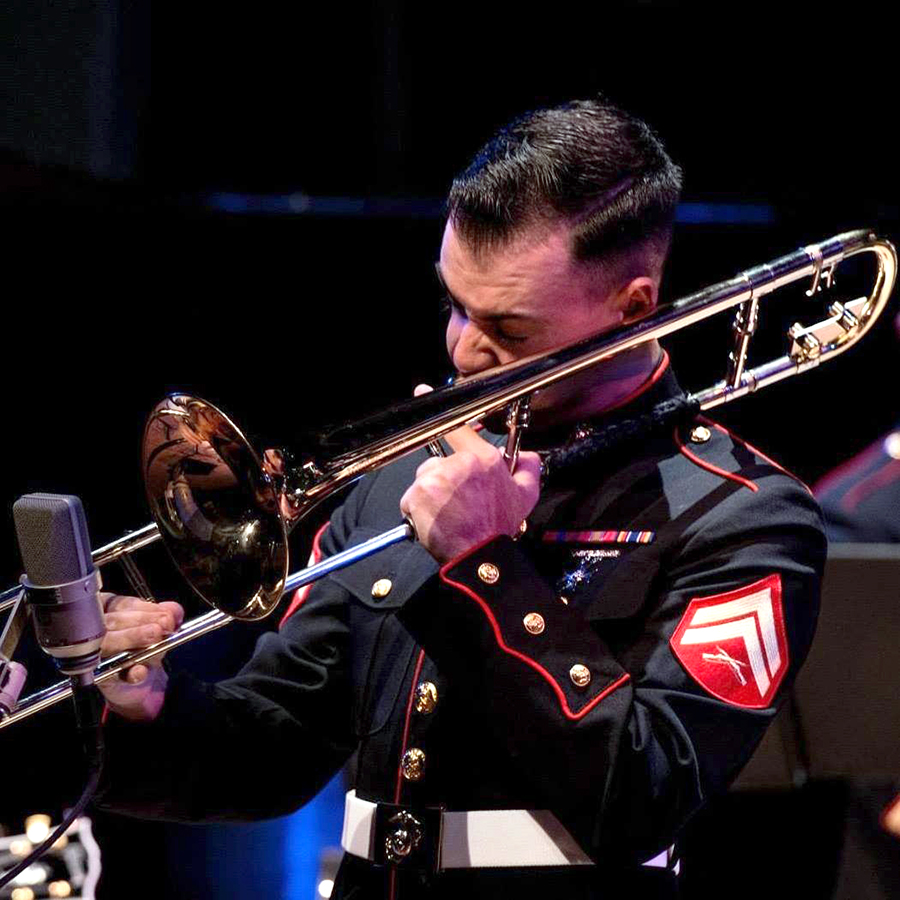
Matt Hall in uniform.
“I did Basic Training at Perris Island, which was three months and then Marine Corps Combat Training, which was a month long, at Camp Lejeune.”
While Hall was in the Corps to play music, he said he took his military training seriously.
“During Basic Training we had to use iron sights on the M16A4 rifle, meaning no scope. They made a transition to a red dot scope right after I got out of Basic Training into Combat Training. We were among the first to do the change. Using the iron sight at Perris Island, it was difficult. I had never shot a rifle in a serious manner until this. And if it’s windy, you have to really account for that, because the bullet will drift a lot in that amount of time. It was certainly a great challenge. I never made expert, but I did okay. It was a skill that I’m very thankful to have acquired. Something I’ll always have with me is the ability to use a rifle and know the real ins and outs of a weapon like that.
“After that, I went to the armed forces School of Music in Virginia Beach for six months. That’s where you learn the Marine Corps marching and ceremony techniques as a band. You also have to play in different ensembles: wind, jazz, jazz combo. Just getting ready for what’s about to come in the fleet. You’re always playing standard Sousa and all that kind of stuff to get you ready. There are a few serious playing tests throughout the program where you have to score a certain grade to graduate the school.
“Ken Ebo, the lead trombonist in the Marine Corps Jazz All Stars, was my lead trombone instructor, and in the early 1990s he had played in a big band with Rick Simerly. It’s an interesting jazz trombone web I’ve started to weave here with a few people! Ebo was a staff sergeant at the time and was an absolutely wonderful teacher.
“I flew into Lindbergh Field for my deployment. I hadn’t even looked up or thought about San Diego weather until I stepped out onto the sidewalk in August or September. There was a beautiful, light breeze, 72 degrees. I thought, ‘Wow, this is incredible.’
“And then I had my first burrito!
“I got out to Miramar. I think within four months or so, I auditioned for the Jazz All Stars, made it on second trombone, and held that gig my entire enlistment.”
In addition to his instructors in the Corps, Hall made another important musical connection, one that continues to enrich his life.
“During my time in the Marine Corps I met Charlie Arbelaez, an alto sax player. He was also in the Corps, but he was at Marine Corps Recruit Depot. We ended up playing a tune together, a blues, and pretty much after that we were joined at the hip.
Life in New York
While Hall said he enjoyed his time in the Corps, his one hitch was enough.
“I was playing so much in town, and, also, I really wanted to get my degrees, finish my bachelor’s, and potentially get my master’s. I got out in October 2015; I served four years. I was a corporal when I got out.”
He and Arbelaez decided to strike out back East to further their jazz careers.
“He got out almost a year before I did, but once I got out, we ended up moving to New York City and finishing our bachelor’s degrees at Purchase College, a conservatory in jazz studies. We were studying with John Faddis, Gary Smolen, Ralph Lalama, Kenny Washington, John Mosca, David Hazeltine, and Dr. Todd Coolman, among others.”
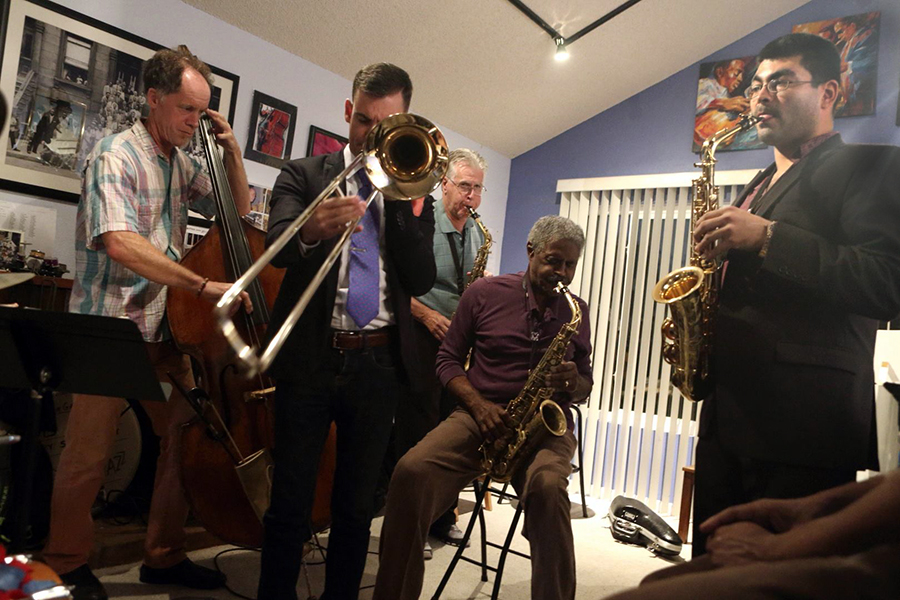
Hall with Rob Thorsen, Christopher Hollyday, Charles McPherson and Charlie Arbelaez.
While Hall had kept up an active professional calendar in both high school and the Marine Corps, he said the campus of the State University of New York at Purchase was rather remote and made gigging in town challenging.
“We would go play with Eric Alexander at Smoke, just because that was a little bit of an earlier session. It was quite difficult to stay out late, because SUNY Purchase was 45 minutes out of the city. We lived in Washington Heights by the George Washington Bridge. Luckily, we had friends who had cars, because the commute was three-and-a-half hours each way, using the train and bus.”
Also, by focusing on their studies more than New York City’s famed jazz nightlife, Hall and Arbelaez were able to complete their bachelor’s degrees more quickly than usual.
“We got waivers and carried roughly 28 credits a semester. We completed the four-year program in two years.”
Hall pointed out that he had some credits from his first semester at Middle Tennessee State, and he and Arbelaez had also received college credit for some of the coursework they had completed in the Marine Corps.
“We finished up our degrees and decided to move back to San Diego pretty much due to wanting to get our weather back! Also, getting around in New York can be very exhausting. If you’re not used to that, it can really take its toll. If you want to go to Trader Joe’s in Washington Heights, that’s going to be half a day! It’s something I never realized, but relying on public transit, while it’s great, does have its delays.
“We were just ready to come back to San Diego.”
Back to SoCal
“Charlie and I both went to San Diego State for our master’s. Bill Yeager was running the jazz program. While I was there, I studied with Bob Boss, Markus Berger, and Anthony Smith.”
Not only did they get to continue studying under world-class instructors at SDSU, they also got to see the world.
“We actually went to Montenegro with the Jazz Ensemble One, directed by Yeager. It was pretty amazing. We would play these shows and a lot of the crowd had never heard jazz before, so it was pretty interesting introducing people to a genre. And the band was absolutely smoking. We played a lot of charts from Yeager’s time with the LA Jazz Workshop, and it was a really wonderful tour from top to bottom, and a really beautiful part of the world. We did a jam session with a couple of the local musicians, both of whom knew Mikan Zlatkovic. We ended up playing in this local bar that is open until six in the morning, and the people in there did not know what in the world to think, especially at first. It was probably eight or nine session attendees on the bandstand, and we really went for it super hard, just playing jazz standards.”
It took him two years to earn his master’s, and since then he has earned his living from music, both performing and giving private lessons.
Hall met his wife, fellow trombonist Jeanne Geiger, while in New York, and they now live in the Palm Desert area, although he continues to gig in San Diego. Another connection he had in San Diego was the late military band leader, arranger, and fellow trombonist Sammy Nestico, who lived in Carlsbad the last part of his life.
“Sammy was a real sweetheart. When my mentor Bill Watrous passed away, a group of us all met at a restaurant in Carlsbad to reminisce. Lo and behold, Sammy and his entourage were eating at the same spot. I believe it was his wife who came over to the bar and said, ‘I notice you all are musicians; someone wants to meet you.’ It was just a one in a million moment.”
Hall’s first introduction to Nestico was at the Armed Forces School of Music, where Nestico’s charts from his years leading both the top Air Force and, later, Marine Corps bands are still active.
“Some of those Nestico arrangements are so well written; it’s not reinventing the wheel, but everything is perfectly placed. It’s really special.”
He said Nestico’s approach to arranging can apply to other areas of music as well.
“The same can be said for improvisation, too: knowing when to take it way out or be flashy, and knowing how to really land the solo very smoothly, just learning that over the years playing. It’s been really interesting the progression of improvisational skills for me, personally. The older I get and the more I play, the more I realize the simple things are more where it’s at.”
Hall was asked why he thinks so many big band leaders have come from the trombone section—with names like Tommy Dorsey, Glenn Miller, Ray Conniff, Jimmy Cheatham, Nestico, and Yeager.
“One logistical reason is when you’re sitting in the big band, lead trombone is dead center. You get a pretty good representation of everything that’s going on.”
His first album—well, first album since high school—came out in 2022. Titled I Hope to My Never, it featured Arbelaez, pianist Jason Shattil, guitarist Louis Valenzuela, bassist Mackenzie Leighton, and Kevin Kanner on drums.
Hall said he is working on two new recording projects at the moment.
“One is a duo project with guitarist Louis Valenzuela. The other is going to be a sextet project, tentatively, and I’m looking potentially to record that in New York City with some players there.”
When setting up a project, whether a live gig or recording session, Hall said he tries to build his band around the rhythm section.
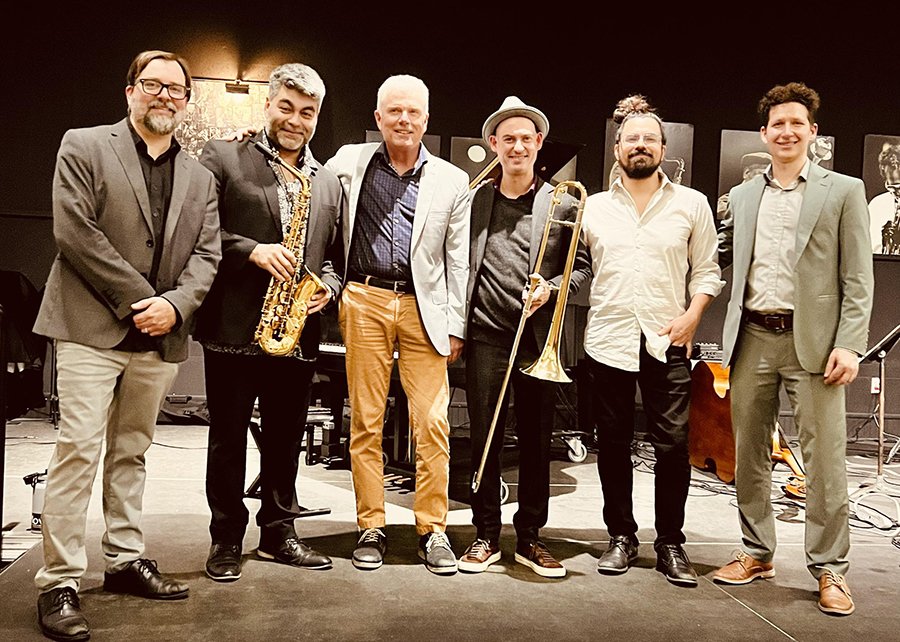
The Matt Hall Sextet at Dizzy’s in January: Doug Walker, Charlie Arbelaez, John Opferkuch, Hall, Fernando Gomez, and Ian Harland.
“Oftentimes I’ll call the drummer first if I’m doing something that needs that. I feel like the drummer really can dictate the overall vibe of a group. What I’m after is someone that, A, has impeccable time, someone who can play any tempo that I call, someone who’s reactive and who’s listening, and, furthermore, I want their equipment to really meet the genre that I’m playing as well. The bebop and modern jazz style, you might want the right equipment throughout, especially on the drums.
“Then bass. Really, for the most part, 99 percent of the time, I only need upright. On rare occasions I’ll need a player who can play both electric and upright. Again, someone with a really good internal sense of time, obviously really good pitch, and good soloing capabilities, too. I really like it when a bass player is very fluid in their bass lines and also in their soloing.
“And finally, your comping instrument, be it piano, guitar, or a vibraphone player. I’m looking for someone who really knows how to comp for a horn player, in the bebop and hard bop genres. The really solid time and the overall driving energy is what I’m after in a rhythm section.
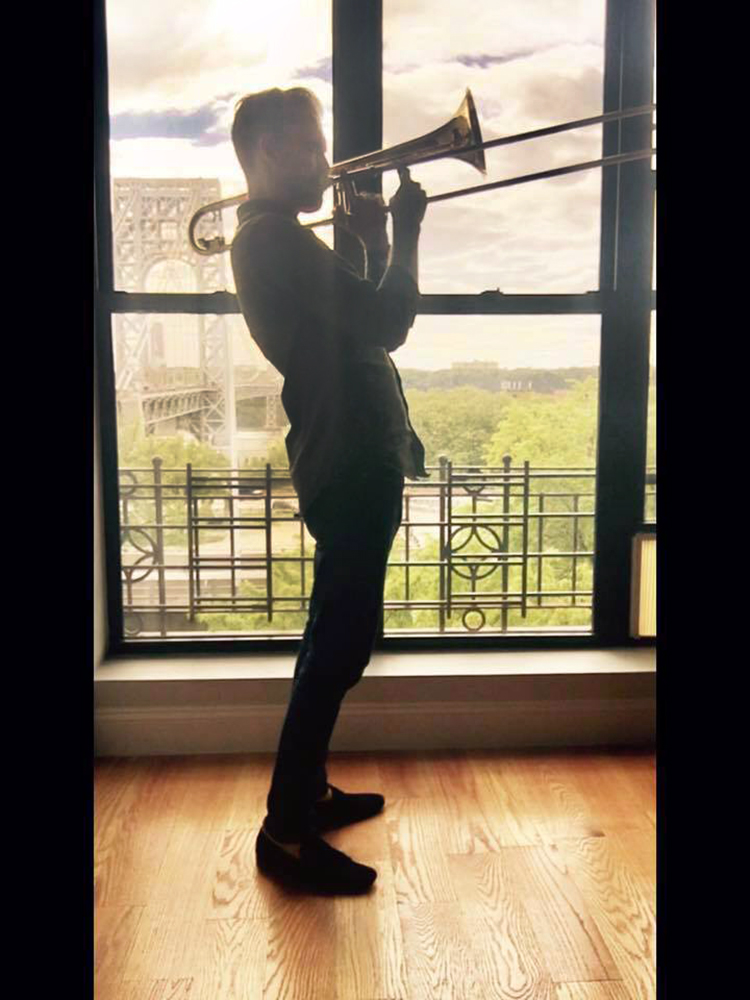
“As far as hiring another horn player, I love to work with tenor and baritone saxophonists, so I can, as a trombone player, comfortably sit either in unison line or on top, acting in a way like a trumpet or flugelhorn would. For example, on countless Blue Note records, that octave sound on the melodies is really nice with the trombone in the upper octave with the tenor or baritone sax playing in their normal range. It’s kind of a unique sound. Playing with trumpeters and alto players is cool, too. It changes the roles quite a bit for the trombone—the alto and trumpet range sits on top, so then I am in more of a tenor type role, which is cool, but I think I prefer playing those upper melody lines.”
When writing new songs, Hall said his style of composition is more inspiration than perspiration.
“It’s kind of interesting. I feel like the best things I’ve written have come to me very quickly, and I’ll write them down pretty much having it in my head. I’ll get a starting pitch with a trombone, or the piano, and just write the melody down. It really has been that clear with a couple things. I wrote one tune in particular, called ‘Spearhead,’ in early 2013. I actually dreamt the melody, woke up at 3 a.m. in my barracks at Miramar, and wrote it down. I had manuscript paper and hand wrote the chart note for note.”
Where to see Matt Hall in March.
March 9, with John Opferkirch, at Pali Wine Co. in Little Italy.
March 16, with Bill Yeager Jazz Orchestra at SDSU.
March 24, with his sexted at the Lou Lou Club in the Lafayette Hotel.










